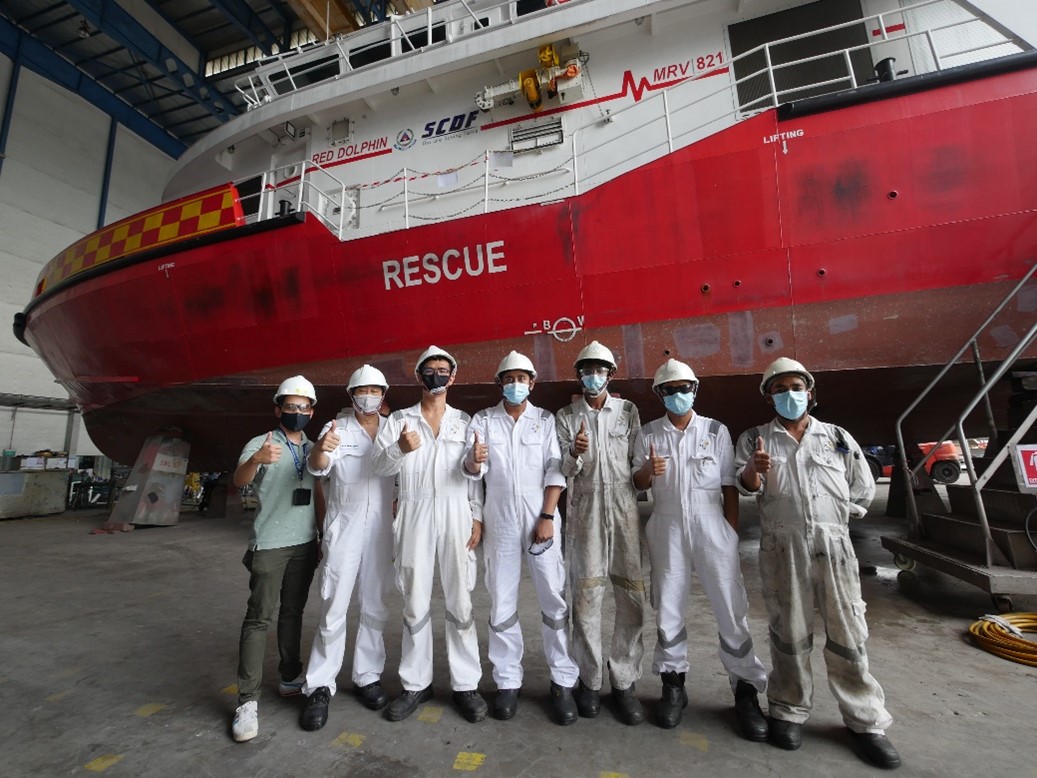.jpg?sfvrsn=ef05d503_1)
Barnacles growing on the underside of a vessel hull can cause more drag resistance to a vessel and burn more fuel, leading to significant financial and environmental costs. To overcome this, Elfeiz Fadhil, an engineer with HTX’s Marine Systems Capability Sustainment, decided to explore the use of ultrasound technology to remove barnacles from vessels that encounter this problem.
“I was inspired to explore alternative solutions when we had to lift an entire SCDF Marine Rescue Vessel (MRV) out of the water using a boat hoist to spray its underside with high-pressure jets to remove the barnacles. Some 10 men were involved in the lifting of the MRV and so many things could go wrong. The need to carry out this process also meant that the vessel could not be deployed for around four days,” said Elfeiz.
I was inspired to explore alternative solutions when we had to lift an entire SCDF Marine Rescue Vessel out of the water using a boat hoist to spray its underside with high-pressure jets to remove the barnacles.

Elfeiz was inspired to explore alternative solutions to tackle the barnacle problem (Photo: HTX)
He is currently forward deployed to SCDF’s Marine Division and looks into the day-to-day maintenance and operation of its vessels. Unlike the patrol boats from Police Coast Guard (PCG) which are deployed for patrol operations daily, the MRV is designated for emergencies such as rendering firefighting and rescue assistance to distressed vessels at sea.
“The MRV only sails out when there is an emergency call and when activated, it must respond to the emergency situation in the shortest time possible. Thus, speed is of the utmost importance. However, being stationary for longer periods in harbour means barnacles tend to grow and cling on the underwater hull of the MRV. Taking the MRV out to clock the mileage required to prevent barnacles from growing is not feasible because it taxes the already lean crew and the fuel consumption is high,” he explained.
He estimated that barnacles cause a speed loss of about 30% or a reduction from the vessel’s design speed of 30 knots to 20 knots. More regular washing of the underwater hull is another option, but the maintenance activity is costly at around $58,000 per wash.

Elfeiz (left) with the maintenance contractors and the MRV (Photo: Elfeiz Fadhil)
A common industrial solution is to coat the underwater hulls of vessels with anti-fouling paint to kill barnacle larvae. However, the paint may also leach into the water and harm other marine life.
For Elfeiz, the ideal solution is one that is environmentally friendly, easily implemented and reduces the cost of underwater hull washing. With that in mind, he decided to give ultrasound technology a shot.
Between November 2019 and May 2020, Elfeiz and his team tested the Ultrasonic Anti Bio-fouling System on the MRV. Costing $9,000 to install, the system emits bursts of ultrasonic waves at multiple frequencies, enabling microscopic bubbles to form on the underwater hull. These bubbles then implode and clean away algae and barnacles.
“It was a solution that fit all the checkboxes and the best part is it’s a plug and play solution, so you only need an electric source and a cable. This solution also effectively allows the MRV to maintain its top speed of 30 knots for a longer period of time and reduce the vessel washing frequency from four times a year to twice a year,” he said.

Elfeiz (right) inspecting the hull of the vessel and the water jet systems with the maintenance contractors (Photo: Elfeiz Fadhil)
The system proved to be so effective that Elfeiz was nominated and won the Minister for Home Affairs Operational Excellence Award in 2020. Not resting on his laurels, Elfeiz is now working to install the ultrasound system on SCDF’s current vessel fleet and he has also included the requirement in the technical specifications for building the next generation of firefighting and rescue vessels.
“Beyond receiving the award, I think the satisfying part for me is seeing how the vessels can respond to emergencies in good time,” he revealed.
With barnacles out of the way, Elfeiz is currently working on a solution to prevent damage on smaller vessels when they are deployed to assist large vessels.
“This happens quite often especially when the waves are strong, and it causes the rescue vessel to hit against the larger ones. I am still exploring solutions, but I hope to find one that is environmentally friendly and easily installed too,” he quipped.
We are always seeking inquisitive and innovative individuals to co-create extraordinary solutions with us.
Join us to be at the forefront of the finest tech capabilities in the field! Join Us

